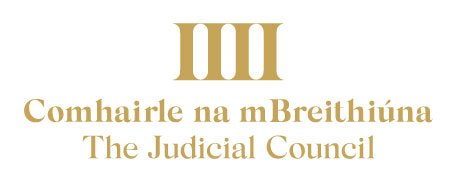The Judicial Council
The Judicial Council was established in December 2019. It is an independent body whose members are all the judges in Ireland. One of its statutory functions includes overseeing the continuing education and training of the judiciary. The Judicial Studies Committee carries out this function on behalf of the Judicial Council. The Committee is funded from the Judicial Council’s overall funding which is provided though the Executive by the Minister for Justice.
The Terms of Reference for the Judicial Studies Committee, adopted by the Judicial Council in February 2020, set out the functions as follows:
- identify and continue to update the needs of the judiciary for education and training;
- develop courses to meet the needs of the judiciary for induction, continuing professional education and development;
- provide, or assist in the provision of, induction, education and training on matters relevant to the exercise by judges of their functions, including but not limited to:
-
-
- dealing with persons in respect of whom it is alleged an offence has been committed,
- the conduct of trials by jury in criminal proceedings,
- the conduct of trials by judges in civil and criminal proceedings,
- European Union law and international law,
- human rights and equality law, information technology, and
- the assessment of damages in respect of personal injuries,
- Child and family law
- Judicial ethics
- Judgecraft, including court management, case management, judgment writing, work practices
-
-
- prepare and distribute relevant materials to judges;
- publish material relevant to its functions;
- promote, explain and protect the core value of judicial independence in judicial training and education;
- in all training and education activities promote and encourage the pursuit of the highest standards of judicial excellence: and,
- establish, maintain and improve communication with:
I. bodies representing judges appointed to courts of places other than the State; and
II. international bodies representing judges.
The Terms of Reference provide for the appointment of a Director of Judicial Studies and specifies that the appointed Director must be a sitting judge who will devote at least 50% of their working time to judicial studies. This is in line with international best practice where a key approach to judicial training is that it is judge-led i.e., judges (insofar as is possible) train judges. In addition, the appointment of a full-time Associate Director of Judicial Studies to support the Director also set out in the Terms of Reference.
The members of the Judicial Studies Committee are taken from each of the five court jurisdictions in Ireland and are:
- Ms Justice Nuala Butler, Chairperson
- Mr Justice Peter Charleton, Director of Judicial Studies
- Mr Justice Brian Murray
- Ms Justice Niamh Hyland
- Ms Justice Liam Kennedy
- Judge Geoffery Shannon
- His Honour Judge Paul Kelly, President of the District Court
- Judge Shalom Binchy
The Judicial Council premises is located in Green Street Courthouse, where a dedicated training venue is under development to support a modern and professional judicial training function.
Detailed information about all activities of the Judicial Studies Committee is available on the Council’s website (https://judicialcouncil.ie/judicial-studies-committee/). The Council’s education and training staff can be contacted by emailing [email protected] or [email protected]
Contact
The Judicial Council
-
Green Street Courthouse
Dublin D07 W568
Ireland - [email protected]
- https://judicialcouncil.ie/judicial-studies-committee/

-
Austria
- Federal Ministry of Justice
-
Belgium
- Judicial Training Institute
-
Bulgaria
- National Institute of Justice
-
Croatia
- Judicial Academy
-
Cyprus
- Judicial Training School
-
Czechia
- Judicial Academy
-
Denmark
- Court Administration
-
Estonia
- Office of the Prosecutor General
- Supreme Court
-
Finland
- National Courts Administration
- National Prosecution Authority
-
France
- National School for the Judiciary
-
Germany
- Federal Ministry of Justice and Consumer Protection
- Academy of European Law (ERA)
-
Greece
- National School of the Judiciary
-
Hungary
- National Office for the Judiciary
- Office of the Prosecutor General
-
Ireland
- The Judicial Council
-
Italy
- School for the Judiciary
- High Council of the Judiciary
-
Latvia
- Judicial Academy of Latvia
-
Lithuania
- National Courts Administration
- Office of the Prosecutor General
-
Luxembourg
- National Council of Justice
-
Malta
- Judicial Studies Committee
-
Netherlands
- Training and Study Centre for the Judiciary
-
Poland
- National School of Judiciary and Public Prosecution
-
Portugal
- Centre for Judicial Studies
-
Romania
- National Institute of Magistracy
-
Slovakia
- Judicial Academy
-
Slovenia
- Judicial Training Centre
-
Spain
- Centre for Legal Studies
- Judicial School
-
Sweden
- Judicial Training Academy
- Swedish Prosecution Authority
